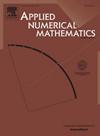A linear-decoupled and unconditionally energy stable fully discrete scheme for Peterlin viscoelastic model
IF 2.4
2区 数学
Q1 MATHEMATICS, APPLIED
引用次数: 0
Abstract
In this paper, we design a linear-decoupled and unconditionally energy stable scheme utilizing the ZEC (“zero-energy-contribution”) technique for the diffusion Peterlin viscoelastic model. This model includes a diffusion term with an arbitrary small diffusion coefficient ε for the conformation tensor C. A specific ODE is introduced to deal with the nonlinear coupling terms for velocity u and C satisfying the ZEC property. We approximate the coupled nonlinear terms using the previous time-step results while still maintaining energy stability, allowing us to solve a linear-decoupled system at each time-step. Moreover, each component of C can be computed in parallel. We prove the unique solvability and energy stability of the fully discrete scheme. Additionally, we derive an error bound for the P2/P1/P2 element, where the constant is not explicitly dependent on the reciprocal of ε. Several numerical experiments are presented to demonstrate the accuracy and performance of the proposed scheme. Comparison with a linear-decoupled scheme excluding the ZEC technique indicates that the proposed algorithm offers superior stability and performance.
Peterlin粘弹性模型的线性解耦无条件能量稳定全离散格式
在本文中,我们利用ZEC(“零能量贡献”)技术为扩散Peterlin粘弹性模型设计了一个线性解耦的无条件能量稳定方案。该模型包含了构象张量C具有任意小扩散系数ε的扩散项,并引入了一种特殊的ODE来处理速度u和C满足ZEC性质的非线性耦合项。我们使用之前的时间步长结果近似耦合非线性项,同时仍然保持能量稳定性,允许我们在每个时间步长解线性解耦系统。此外,C的每个组成部分都可以并行计算。证明了全离散格式的唯一可解性和能量稳定性。此外,我们导出了P2/P1/P2元素的误差界C(τ+h2),其中常数C不显式依赖于ε的倒数。几个数值实验证明了该方法的准确性和性能。与不含ZEC技术的线性解耦方案的比较表明,该算法具有更好的稳定性和性能。
本文章由计算机程序翻译,如有差异,请以英文原文为准。
求助全文
约1分钟内获得全文
求助全文
来源期刊

Applied Numerical Mathematics
数学-应用数学
CiteScore
5.60
自引率
7.10%
发文量
225
审稿时长
7.2 months
期刊介绍:
The purpose of the journal is to provide a forum for the publication of high quality research and tutorial papers in computational mathematics. In addition to the traditional issues and problems in numerical analysis, the journal also publishes papers describing relevant applications in such fields as physics, fluid dynamics, engineering and other branches of applied science with a computational mathematics component. The journal strives to be flexible in the type of papers it publishes and their format. Equally desirable are:
(i) Full papers, which should be complete and relatively self-contained original contributions with an introduction that can be understood by the broad computational mathematics community. Both rigorous and heuristic styles are acceptable. Of particular interest are papers about new areas of research, in which other than strictly mathematical arguments may be important in establishing a basis for further developments.
(ii) Tutorial review papers, covering some of the important issues in Numerical Mathematics, Scientific Computing and their Applications. The journal will occasionally publish contributions which are larger than the usual format for regular papers.
(iii) Short notes, which present specific new results and techniques in a brief communication.
 求助内容:
求助内容: 应助结果提醒方式:
应助结果提醒方式:


